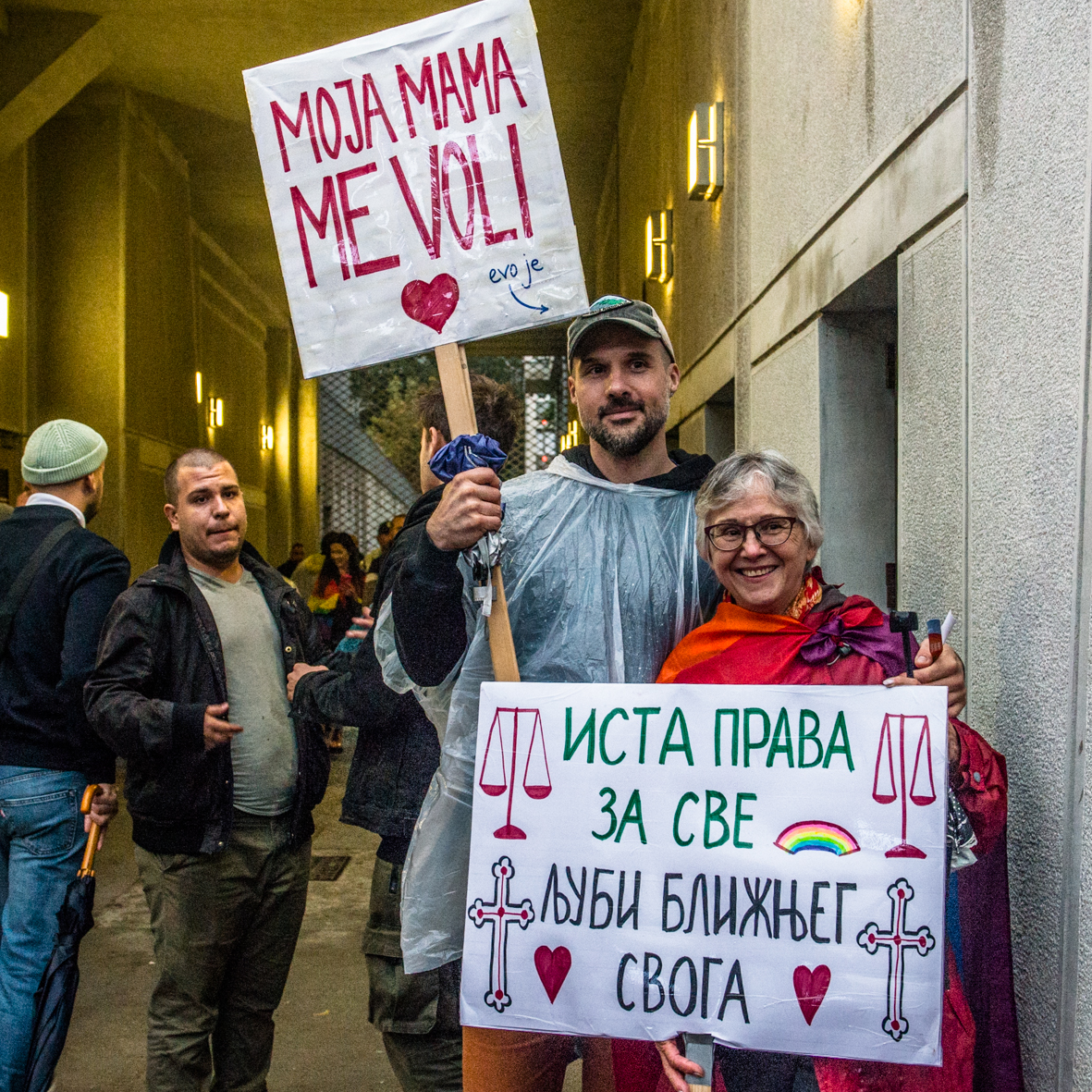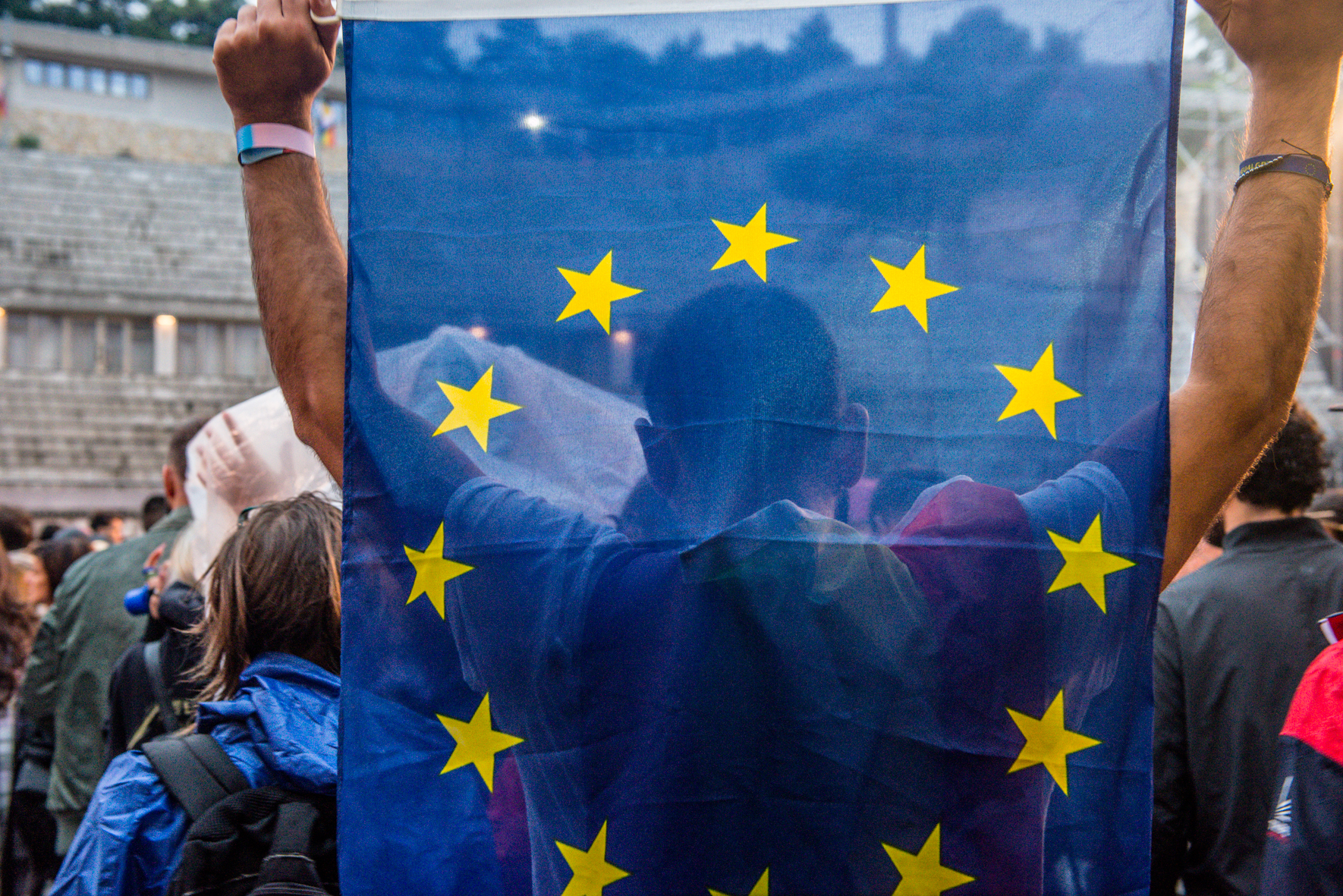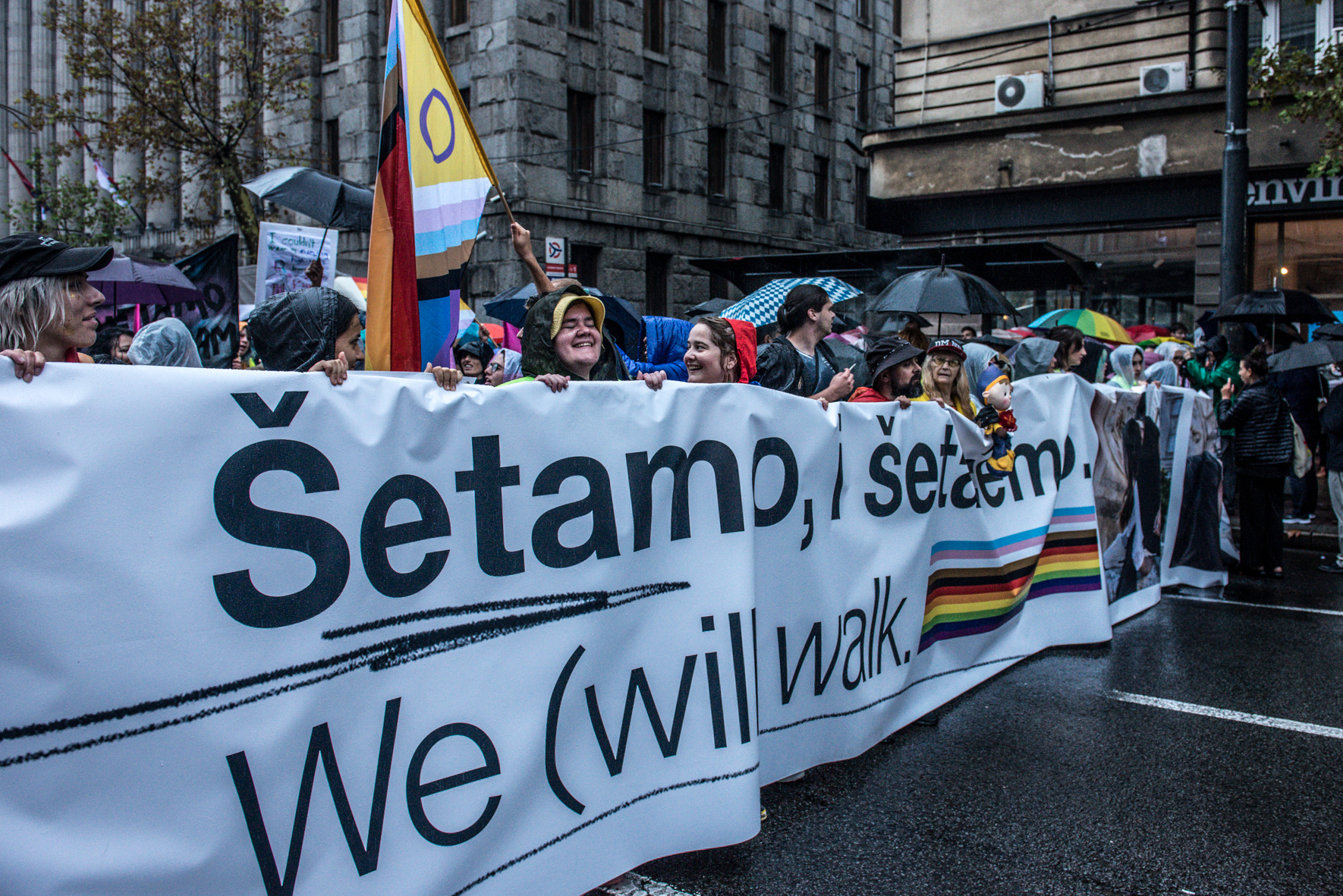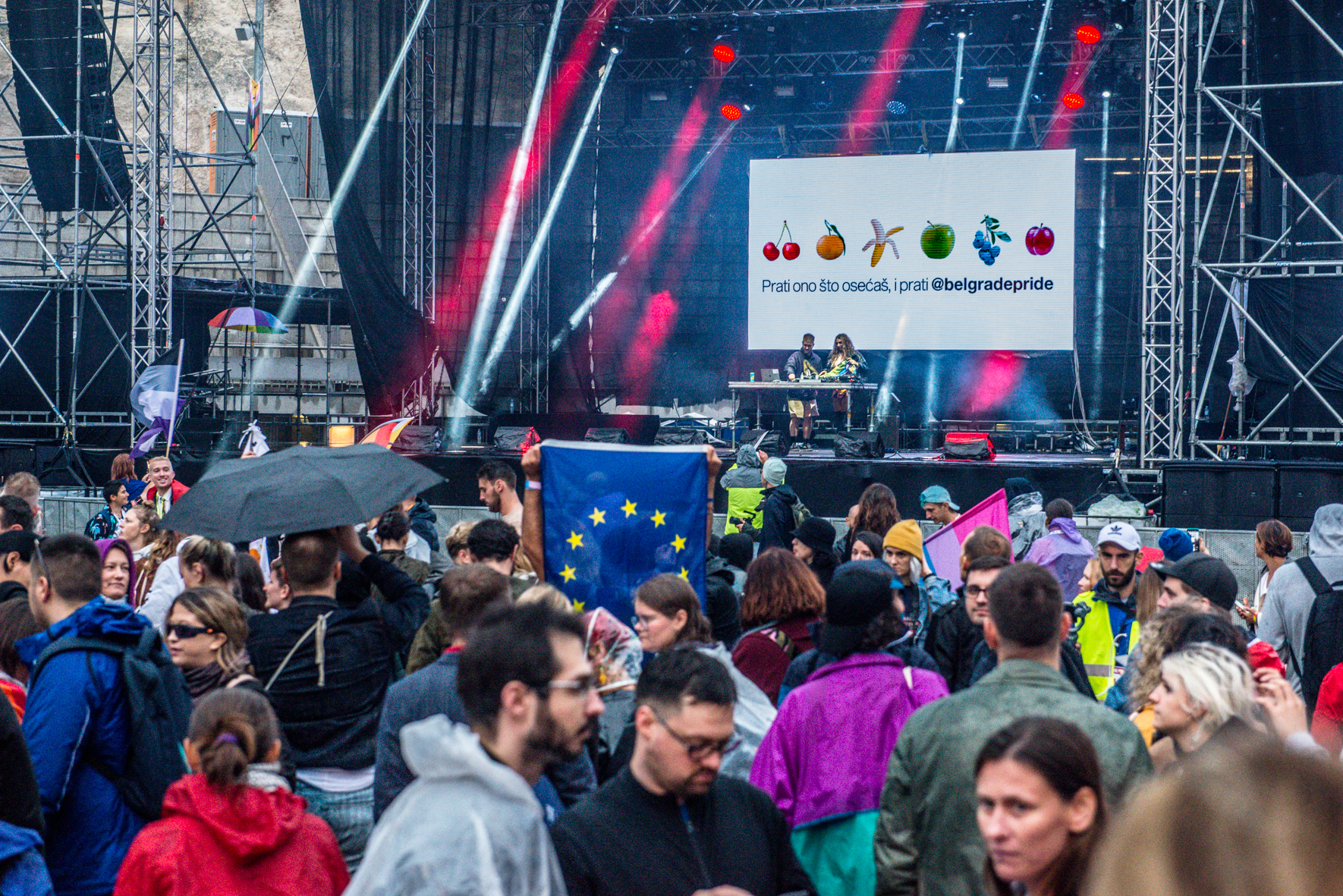“We’re not even close” was the slogan of this year’s Belgrade Pride so as to draw attention to the fact that the LGBTQI+ community in Serbia is facing increased violence and discrimination.
“If Serbia finally got a law on same-sex unions, I would immediately return to Serbia. Why not? Daniel and I would then have a choice. And that, I guess, is the essence of democracy and freedom of life,” says 35-year-old Ivan Zidarević, originally from Belgrade, who moved to his partner in Croatia ten years ago.
They chose Croatia for their life together, because the then Croatian government announced the adoption of the Life Partnership Act, according to which Ivan and Daniel would have the same rights as if they were married. The act was passed two years later in 2014, and Ivan and Daniel were the first couple to make their relationship legally official in Croatia, on 5 September 2014. Precisely because of this act, Ivan got a Croatian citizenship, the possibility to work in Croatia, and also to inherit half of the apartment they acquired together in their family union. With this act, Ivan and Daniel also got the possibility to support each other, if one of them loses a job or visit each other in the hospital, if one of them falls ill. Adoption and fostering of children are regulated by the act.
If they had started their life together in Serbia, none of this would have been possible, even though Serbia had the first draft law on same-sex unions back in 2010. The twelve-year struggle of 10% of Serbian citizens, being the estimated number of LGBTQI+ people living in Serbia, is still at the beginning. The Ministry of Human and Minority Rights announced the adoption of this law back in May 2021, but everything stopped when the President of Serbia, Aleksandar Vučić, stated that he would not sign the law, if adopted by the Serbian Parliament, because, as he said, it was against the Constitution of Serbia, which defines marriage as the union of a man and a woman.

“Same rights for everyone. Love thy neighbour.” Despite religious protests and a restricted Pride March, the EuroPride event for the LGBTQI+ community in Europe, went ahead in Belgrade in September 2022.
“We have been on a standby for 12 years. We are ten years behind Croatia. We have a Prime Minister who is gay, but she has not done anything for the rights of the gay people in Serbia”, says Ivan Zidarević. “She even got a child, all good, but other citizens who are gay have no right to that. She says that the child is hers and what if the police stops her? Whose child is she with, how does she cross the border with him? As Prime Minister, she would be allowed to do anything. It’s all so sad”, says Ivan indignantly.
“I don’t know if everything is going back to the beginning and how the new government will act on this matter. The draft law does exist”, says the Serbian Commissioner for the Protection of Equality, Brankica Janković, adding that the Republic of Serbia is obliged to adopt and implement all legal acquis of the EU in the process of European integration, in accordance with the recommendations of the Council of Europe, and this been one of the recommendations of the Commissioner for years now. “So far, 29 European countries have recognized same-sex couples relations in different legal forms, so I hope that Serbia will do the same soon”, says the Serbian Commissioner for Protection of Equality.
Ana Petrović, who fights for the rights of LGBTQI+ people in Serbia as part of the Da se zna organisation, is of the opinion that the law on same-sex unions is a necessity in a democratic society, as Serbia aspires to be. “The law does not bring any special rights, nothing more in compared to the rights of the majority community. In fact, the law would only make us equal in rights, nothing more than that. This is difficult to explain in a deeply divided, impoverished society, where almost everyone feels disenfranchised in some way and then somehow these rights of ours seem like something more and somehow more special”, says Ana, adding that it is the legal minimum the LGBTQI+ people would have and several legal opportunities for a safer and more dignified life, as much as this is possible in Serbia.

The representatives of non-governmental organisations that deal with the rights of LGBTQI+ persons were asked to accept the amendments to the law to introduce a notary instead of a registrar, as well as that there is no possibility of taking the partner’s last name. Most of the organisations rejected the proposed changes, and according to Goran Miletić, Director for Europe at Civil Rights Defenders and EuroPride 2022 coordinator, although it is important for Serbia to get the law on same-sex unions as soon as possible, if the representatives of the government do not give up on the requested amendments, it is better that the law is not passed at all.
“The government certainly disappointed the LGBTQI+ community in Serbia, since it did not adopt the law last year, as it was planned. There was not a single reason for the non-adoption”, believes Miletić, adding that it is dangerous “if one acts on behalf of those who are not even affected by the law, and are against it for purely populist reasons”.
Right-wing political parties in Serbia, which in the last elections entered the republican parliament with about 15% of the votes, are against the law, but also against EuroPride, which was held in an shortened format in September 2022 in Belgrade. The most numerous among them, the Serbian Movement Dveri, requested the cancellation of EuroPride 2022, because, as they stated, “that manifestation is an undemocratic violence of the minority against the majority of the citizens of Serbia.” Goran Miletić, coordinator of the EuroPride in 2022, characterised this request by Dveri as “sad, ridiculous and cynical”, reminding that Serbia guarantees the rights of all its citizens with its constitution, but also with many international documents, including the right to sexual orientation and gathering.
Three years ago, Belgrade was chosen to host of the central European LGBTQI+ manifestation, called EuroPride, in competition with the cities of Barcelona, Lisbon and Dublin. According to the Commissioner for Human Rights Brankica Janković, Europride 2022 was indeed “an opportunity for Serbia to show that we as a society have matured and are ready to support the promotion of European values and human rights”. Unfortunately, although EuroPride was held, the Pride March had been canceled “for security reasons”, but under the pressure of the USA and the EU, it was still be held along a shortened route and with strong police forces. The Serbian Orthodox Church was against EuroPride alongside the right-wing organisations.

All this deeply disappointed Ivan Zidarević, who says that he did not want to come to Belgrade in such an atmosphere of “threats and fear”. “I wasn’t present at the Pride, I didn’t want to go like a clay pigeon to be beaten there,” Ivan said, adding that he was very disappointed, first of all, with the attitude of the Serbian Orthodox Church and Patriarch Porfirije towards the LGBTQI+ community.
“Here in Croatia, we thought about why holding Pride in Serbia was a matter of life and death for the Serbian Orthodox Church. I still don’t understand. I’m sorry that everything happened like it did, people were affected detrimentally, which will only make the position of LGBTQI+ people in Serbia even more difficult”, says Ivan. The church and right-wing organisations have gone one step further when it comes to the rights of LGBTQI+ persons. They are increasingly trying to remove lessons about the LGBTQI+ community, sexual orientation and gender identity from the school curriculum. The church demands that biology lessons be withdrawn, while the right-wing Dveri movement “found” controversial LGBTQI+ content in history, sociology and civics textbooks.
Although it is only about 15% of the support they enjoy among the citizens of Serbia, right-wing organisations have imposed themselves as an unavoidable and most important factor when it comes to the rights that LGBTQI+ people should have. Ana Petrović believes that this is an “orchestrated campaign of hate speech and discrimination, artificially caused to cover up other, bigger political and economic problems that Serbia is facing.”
“Even though it is an artificial creation, it is not comforting because the consequences are great and terrible. We can see this by the number of attacks on people from the community, which have increased significantly, by their nature, by the place where they happen, especially in small communities, but also on social networks”, says Ana. She was at the in Belgrade with her daughter and she believes that a society, whatever it may be, can only be changed by laws, and that change will certainly not happen overnight.

“Society changes with the visibility of problems and solutions. It changes with information. It changes with education. What is devastating is that we have legal mechanisms and legislation for all this. We also have an obligation to abide by international conventions and to harmonize domestic regulations with those of the EU. There is a lack of responsibility, which is needed for this – of the state, but also of everyone else”, Ana believes, adding that “a complicated legal impersonal story is not behind the story of the adoption of the law, but real people and their lives and the minimum rights that they deserve”.
“Twice a year, Daniel and I come to Belgrade, now only as tourists, even though it is my city. We enjoy it here, we haven’t had any problems, but we don’t publicly hold hands on the street, we don’t kiss, I don’t know what would happen if we kissed on the street”, says Ivan adding that he is sorry that things are that way, that he is not more free and that he and his partner still cannot exercise their rights in Serbia.
“Croatia and Serbia are similar environments. The first Pride in Croatia passed disastrously, just like in Serbia. And nothing happened overnight in Croatia either, it took time, but now everyone is in a positive mood towards us, even the politicians, political support is given, with fingers crossed”, says Ivan, considering that the situation in Serbia is also slowly changing, that people are becoming more tolerant, but still LGBTQI+ people suffer violence on the street, but also in the family, because Serbia, says Ivan, is a very conservative environment.
“During my lifetime it will not be normal to say that you are gay in Serbia”, says Ivan, adding that he still hopes for progress, which would reduce discrimination and contribute to the acceptance of LGBTQI+ people as equal citizens of Serbia, which will however not happen, Ivan believes, “without legal frameworks.”
The fight for LGBTQI+ rights in Serbia
Despite religious protests and a restricted Pride march, the annual EuroPride event for the LGBTQI+ community in Europe, went ahead in Belgrade in September 2022.
The fight for LGBTQI+ rights in Serbia has been going on for more than 21 years, since 2001, when the first Pride in Serbia was held in Belgrade, which was interrupted due to attacks by neo-Nazi organizations and football fans, including representatives of the Serbian Orthodox Church. The next Pride was supposed to take place in 2004, but was canceled for security reasons.
For the next six years, LGBTQI+ organisations in Serbia did not schedule a Pride, and in 2010, nine years after the first Pride was held, there were more than 150 people injured and around 250 detained due to riots caused by representatives of right-wing organisations in Belgrade. The first peaceful Pride in Belgrade took place in 2014, and since then it has been held every year with strong police forces guarding the Pride’s participants.
In 2009, the law on Prohibition of Discrimination, which prohibits discrimination against LGBTQI+ persons was adopted. In 2012, amendments to the criminal code were adopted, which introduced into the law a provision on hate crime and a mandatory aggravating circumstance for criminal acts committed out of hatred due to gender, sexual orientation or gender identity. The first verdict was after 6 years, as a result of domestic violence against a member of the LGBTQI+ population. In 2021, the Ministry of Human and Minority Rights presented the law on same-sex unions, whose fate is still unknown.
Original in Serbian.
Translated into English by Jasmina Đekić.
This text is protected by copyright: © Marina Fratucan / Tipping Point. If you are interested in republication, please contact the editorial team. Copyright information on pictures and graphics are noted directly at the illustrations or on top of the article. Cover picture: EuroPride 2022 in Belgrade. Photo: Dejan Petrović